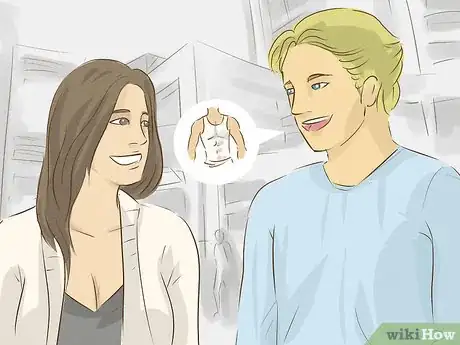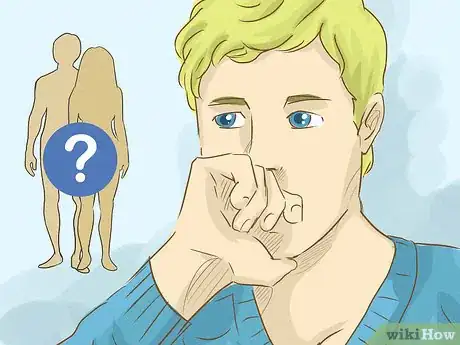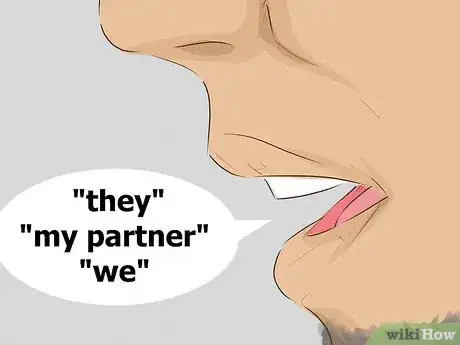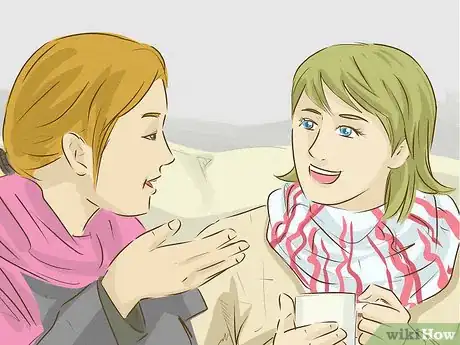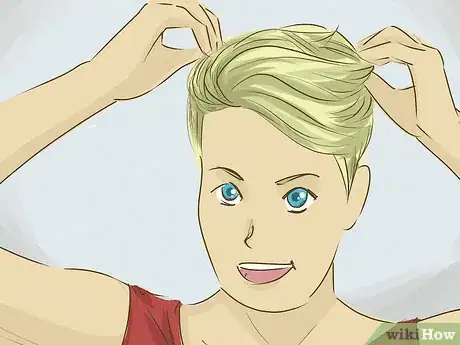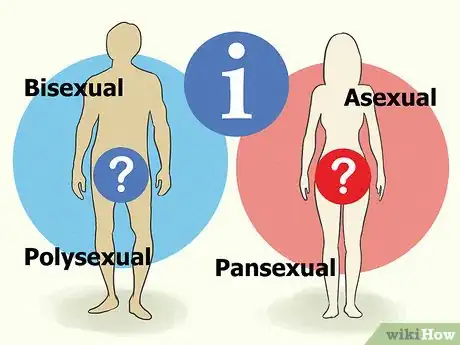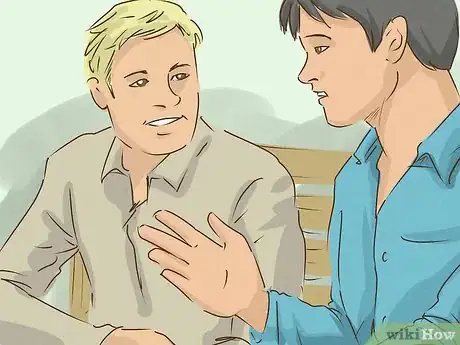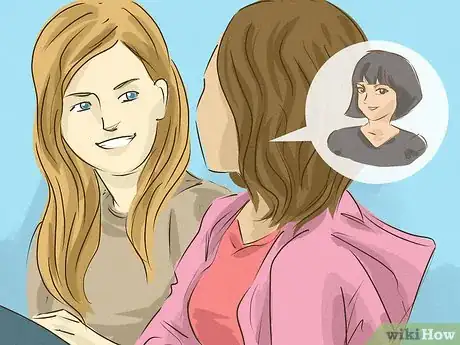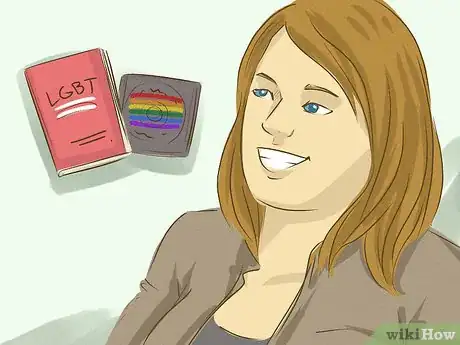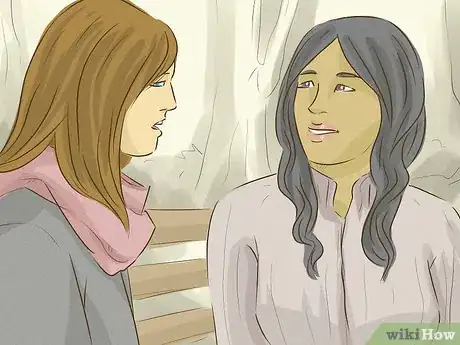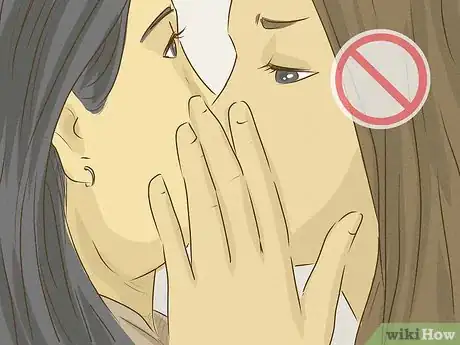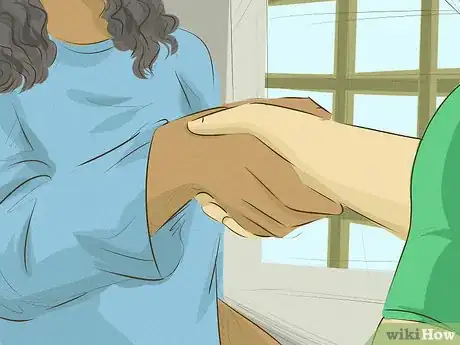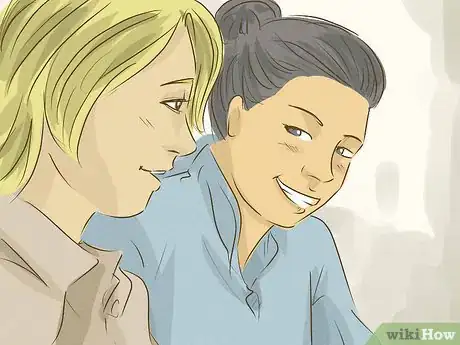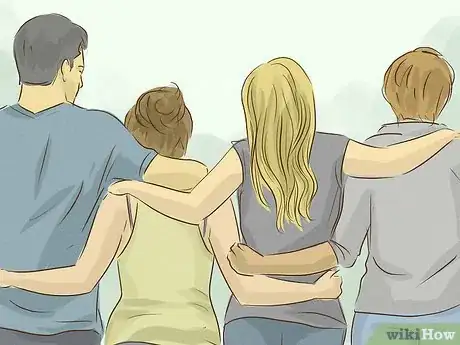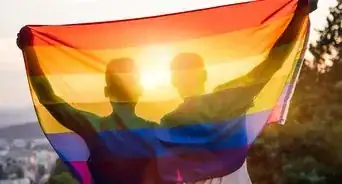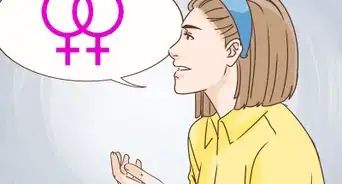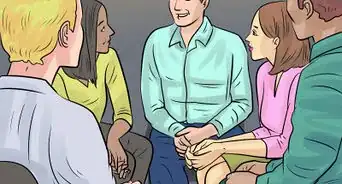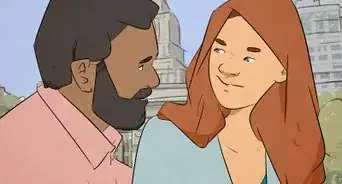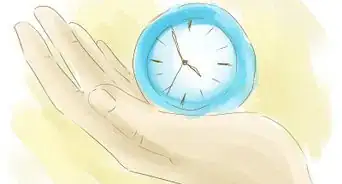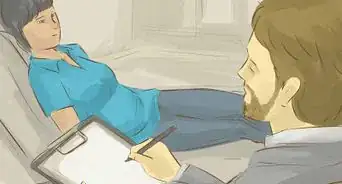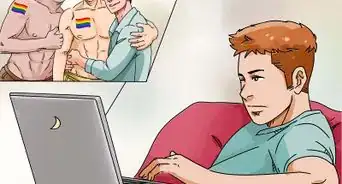This article was co-authored by Deb Schneider, LCSW, PPSC and by wikiHow staff writer, Danielle Blinka, MA, MPA. Deb Schneider is a Licensed Clinical Social Worker in private practice in Oakland, CA, and a Program Manager for the Weiland Health Initiative at Stanford University. With over 15 years of experience, she specializes in creating safe spaces, respectful of marginalized identities, at the high school and college levels. Deb holds a Bachelor’s degree in Sociology and Women's Studies from Clark University and a Master of Social Work (MSW) with Health Concentration from the University of California, Berkeley School of Social Welfare.
There are 8 references cited in this article, which can be found at the bottom of the page.
This article has been viewed 515,891 times.
You may want to know if someone is bisexual because you want to ask them out or hope to be a supportive friend. While you can't tell if someone is bisexual by how they look, you might be able to figure it out if you pay attention to what they say and do. However, the best way to know if someone is bisexual is to just talk to them. If you're interested in dating them, ask them out or get to know them as friends first. Additionally, keep in mind that someone's sexuality is personal, so don't violate their privacy or pressure them to come out.
Steps
Observing Their Words and Actions
-
1Pay attention to what the person says about people's attractiveness. Bisexual people can find either sex attractive, though they won't be attracted to everyone. To figure out if they may be bi, listen to them comment on other people's bodies. Additionally, point out attractive people to them and see how they respond.[1]
- For instance, let's say you're at the beach with your friend. A guy who is bi might say things like, “That girl is fine,” while also saying things like, “I'm so distracted by that guy's abs.”
- Keep in mind that this doesn't necessarily mean the person is bi. Some people are just comfortable talking about people's bodies.
-
2Reflect on the person's past relationships and crushes. If the person is bisexual, they may have dated or had crushes on people of any gender. Listen to what they have to say about their partners or crushes. Additionally, consider what they've shared with you about who they're interested in dating.[2]
- For instance, let's say you know your friend has been dating a guy recently but previously had a close relationship to a girl that seemed romantic. This could mean your friend is bi, but not necessarily.
- Similarly, let's say you know a guy who often dates women, but he's also talked about how he thinks a mutual male friend is the perfect guy. He may be bi.
Advertisement -
3Notice if they use “they” when talking about dates or crushes. Someone who is bi and in the closet might not want you to know the gender of the person they're dating or crushing on. Instead of using “he” or “she,” they might use “they” or “them” when referring to the person. Listen to them closely to see if they tend to do this.[3]
- For instance, they might say something like, “I ran into my ex the other day. They're doing well, but I'm still glad we broke up.”
- They might also be using “they” because it's their date's preferred pronoun or because they think gendered pronouns are outdated. Don't automatically assume that they might be bi.
-
4Recognize if they refuse to talk about their love life. Someone who is bi may not like talking about who they date because they're worried they'll accidentally reveal too much. Consider if the person never wants to talk about their love life, even if you ask about it. Then, tell them about what's going on in your love life to see if they reciprocate.[4]
- You might say, “Dating has been rough lately. Last weekend I had a first date, but it didn't go well.” Then, see if they share.
- Don't pressure them to talk because they may not be ready. Additionally, don't assume that someone is bi because they won't open up to you. They may just be a private person.
-
5Avoid making assumptions based on how someone looks or speaks. Sometimes media representations show bisexual people as either androgynous or over sexualized. However, both of these stereotypes are misrepresentations. Don't judge someone based on the clothes they wear, the hairstyle they choose, the way they walk or move, or the way they talk.[5]
- For example, don't assume a girl who prefers short hair and masculine clothing must be a lesbian or bisexual.
Talking to Them about Sexuality
-
1Recognize that there are many different types of sexuality. Sexuality is a complex topic that's full of grey areas, so you can't assume that the person will label themself as bisexual even if they're attracted to more than one gender. In addition to gay, lesbian, bisexual, and straight, they could identify with one of the following:[6]
- Pansexual or omnisexual means you're attracted to people regardless of gender.
- Sexually fluid means your sexual identity can change.
- Ambisexual means you're attracted to both genders and may be used as a replacement term for bisexual.
- Asexual means you aren't sexually attracted to other people.
-
2Discuss your own sexuality to bring up the topic. Being open about your sexuality, no matter what it is, can make others feel comfortable opening up to you. Bring up the topic of sexuality to see if they're open to talking about it. If they seem comfortable, tell them about your sexual identity.[7]
- You might say, “I'm watching this TV show that has great gay and bi representation. What did you think of the characters?” If they have a positive response to the topic, you might add, “I'm bi, so I like that they're not sticking to stereotypes.”
-
3Tell them that you're a supporter of the LGBTQ+ community. Coming out can be scary when you don't know how the other person feels about LGBTQ+ issues. Expressing your support for the community will tell them that you're an ally without suggesting anything about their sexuality. Be open about your position and let them know you'll be there for your LGBTQ+ friends.[8]
- You might say, “I think love is love, so I'm an ally for the LGBTQ+ community,” or “I started questioning my sexuality when I was a preteen, and I finally realized last year that I'm a lesbian. Now I'm trying to support my friends who are LGBTQ+.”
-
4Ask them about their sexuality if they seem comfortable talking about it. The only way to be truly sure someone is bi is to ask them. If you think they'll be comfortable sharing their sexual identity with you, just go ahead and ask. If they rebuff the question, change the subject and respect their privacy.[9]
- Say something like, “Have you ever questioned your sexuality?” or “Do you think you could be bisexual?”
- If they don't want to answer, say, “No worries. How has work been lately?”
-
5Allow them to decide whether or not they want to come out. You likely have good intentions, but it's important to remember that they don't have to be honest with you. A person's sexuality is private, so don't pressure them to tell you if they aren't ready. Give them the time and space they need to come out to you. Additionally, don't out them if they do come out to you.[10]
- If they tell you they're bi, keep that information to yourself. If someone asks you about it, say, “If you want to know, you'll have to ask them.”
-
6Don't discuss someone's sexuality with other people. You might be afraid to talk to the person about their sexuality, and that's understandable. However, it's not okay to discuss it with other people or ask people if they think the person is bi. This is gossiping and can lead to rumors and hurt feelings. Keep your thoughts and questions about their sexuality to yourself until you're ready to talk to them directly.[11]
- For instance, don't say, “I heard that Ashley and Lauren kissed last night. Do you think they're bi?”
Asking Them on a Date
-
1Ask them on a date if they tell you they're bisexual. Once you know for sure that they're open to dating either sex, try asking them on a date. Let them know that you're interested in seeing them romantically, then suggest an activity that you both enjoy.[12]
- Say, “I really like hanging out with you and I think we could be more than friends. Would you like to go mini golfing with me on Friday as a first date?”
- Keep in mind that being bisexual doesn't automatically mean that they're attracted to everyone. It's possible that they won't be interested in a romantic relationship.
-
2Invite them out as friends if you're not sure they're bisexual. It's hard to just be friends with someone you're crushing on, but developing a friendship with them can help you figure out if they're open to dating you. Consider your common interests, then choose an activity that you'll both enjoy. Ask them to join you for that activity as a friend outing.[13]
- For instance, let's say you both like a local band. You might say, “The Hatracks are playing on Friday. Do you want to go with me?”
-
3Spend time with them so they feel comfortable opening up to you. Ask them to hang out so your friendship will become deeper. Additionally, text or message them every day so you're constantly in touch. This will help them feel comfortable around you so that they may open up to you about their sexuality.[14]
- Be open about your own sexuality so that they're more likely to talk about there's.
- You could say, “I still remember my first crush on a girl. Has that ever happened to you?”
-
4Flirt with them if you think they might be interested in you. First, give them a small compliment about their looks. Then, try commenting on their body. If they seem receptive, give them a pet name to see if they reciprocate. When you feel ready, try touching them lightly to break the touch barrier.[15]
- Take things slow so that you're both comfortable with what's happening.
- You might tell them, “Wow that top really shows off your assets,” or “Your butt looks great in those jeans.”
- If the other person seems uncomfortable, back off immediately. Respect their boundaries at all times.
-
5Deal with rejection by spending time with friends. Dating can be hard, and sometimes you'll experience rejection. While it feels awful, being rejected doesn't mean there's something wrong with you. It just means that this person isn't the one for you. To help you feel better, go out with your friends so they can remind you how loved you are.[16]
- You might also make a list of the wonderful things about you to boost your confidence.
Community Q&A
-
QuestionMy best friend snapped at me when I asked her if she was bisexual, does this mean that she is?
 Community AnswerNo, not necessarily. She may have snapped because she was offended, surprised, or for some other personal reason. Of course, it could mean she is bisexual, but you can't assume it just from her response.
Community AnswerNo, not necessarily. She may have snapped because she was offended, surprised, or for some other personal reason. Of course, it could mean she is bisexual, but you can't assume it just from her response. -
QuestionI'm struggling to find my sexuality, it stresses me. How do I know if I'm bisexual, and how do I know if I'm gay?
 Tom De BackerTop AnswererYou are not obligated to define yourself. Instead of finding a label to find your identity, remember that you are already you and that is enough. If you find a nice box to tick that you're comfortable with, that's great. Also, your preference can change over time, though not usually overnight. If you love one man, it doesn't mean you're gay, let alone for the rest of your life. Focus on the small, on the personal. Find someone you love who loves you back, enjoy that, don't worry about the label.
Tom De BackerTop AnswererYou are not obligated to define yourself. Instead of finding a label to find your identity, remember that you are already you and that is enough. If you find a nice box to tick that you're comfortable with, that's great. Also, your preference can change over time, though not usually overnight. If you love one man, it doesn't mean you're gay, let alone for the rest of your life. Focus on the small, on the personal. Find someone you love who loves you back, enjoy that, don't worry about the label. -
QuestionMy friend and I kissed. Could this mean she's lesbian?
 Community AnswerIt could, or it could mean she's bisexual, or perhaps she was just experimenting. The only way to know is to ask her.
Community AnswerIt could, or it could mean she's bisexual, or perhaps she was just experimenting. The only way to know is to ask her.
Warnings
- Never harass or bully someone over their sexual identity. If you witness someone being bullied, tell an authority figure immediately.⧼thumbs_response⧽
References
- ↑ https://www.psychologytoday.com/us/blog/love-and-sex-in-the-digital-age/201412/is-your-man-gay-straight-or-bisexual
- ↑ https://www.cosmopolitan.com/uk/love-sex/relationships/a19083647/how-to-know-if-a-woman-is-lesbian-bisexual/
- ↑ https://www.pride.com/comingout/2016/5/19/3-signs-your-friend-gay-and-wants-talk-about-it
- ↑ https://www.pride.com/comingout/2016/5/19/3-signs-your-friend-gay-and-wants-talk-about-it
- ↑ https://www.healthyplace.com/gender/bisexual/what-is-bisexual-what-does-it-mean-to-be-bisexual
- ↑ https://www.healthyplace.com/gender/bisexual/what-is-bisexual-what-does-it-mean-to-be-bisexual
- ↑ https://www.nhs.uk/live-well/sexual-health/am-i-gay-lesbian-or-bisexual/
- ↑ https://www.cosmopolitan.com/uk/love-sex/relationships/a19083647/how-to-know-if-a-woman-is-lesbian-bisexual/
- ↑ https://www.cosmopolitan.com/uk/love-sex/relationships/a19083647/how-to-know-if-a-woman-is-lesbian-bisexual/
- ↑ https://www.nhs.uk/live-well/sexual-health/am-i-gay-lesbian-or-bisexual/
- ↑ https://www.psychologytoday.com/us/blog/love-and-sex-in-the-digital-age/201412/is-your-man-gay-straight-or-bisexual
- ↑ https://www.seventeen.com/love/a17223858/what-to-do-when-your-crush-out/
- ↑ https://www.seventeen.com/love/a17223858/what-to-do-when-your-crush-out/
- ↑ https://www.seventeen.com/love/a17223858/what-to-do-when-your-crush-out/
- ↑ https://www.seventeen.com/love/a17223858/what-to-do-when-your-crush-out/
- ↑ https://tinybuddha.com/blog/heal-rejection-5-steps-soothe-pain/
- ↑ https://www.advocate.com/bisexuality/2014/06/02/13-things-never-say-bisexual-people
About This Article
If you want to know if someone is bisexual, try commenting on how attractive people of other genders are and see how they respond. If they're bi, they might respond to comments about males and females equally. It might also help to consider their past relationships and crushes for clues. For instance, if the person often dates women but also talks about other guys a lot, they might be bi. If you want to bring up bisexuality in conversation, you can mention something you read or share something about your own sexuality. For example, try saying something like, "Did you hear about that actor who came out as bisexual recently? I think it's great that he's proud of who he is." You could also add, “I'm bi myself and it makes me proud to see others coming out." For more tips, including how to tread lightly if your friend doesn't want to come out yet, read on!
